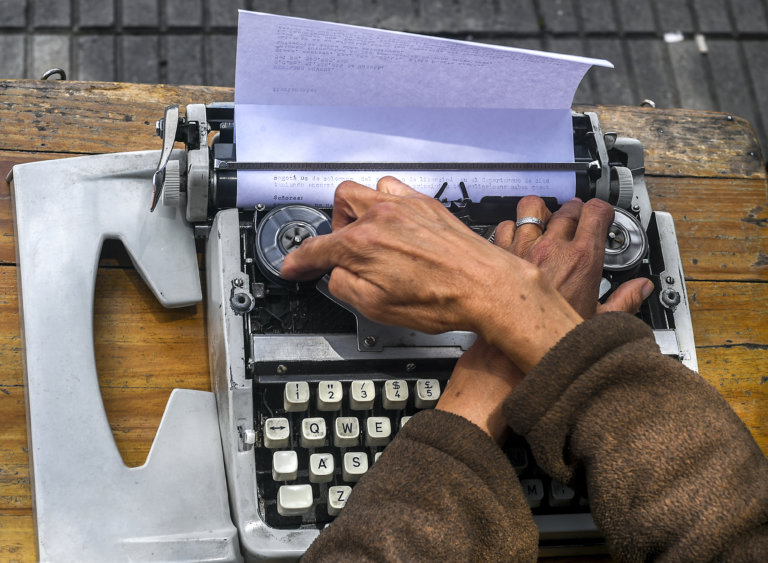
For those of us who live by our pen, looking at how to become a better writer is a daily task.
Carefully and consciously building sentences that tell a story, express an emotion, relay a fact or simply sound satisfying — it’s a lifelong journey.
Maya Angelou’s line, “There is no greater agony than bearing an untold story inside you,” rings true for many.
On the journey of how to become a better writer, one of the first things people tell you is if you want to write well, read widely.
As a student, I would reach for classics such as “Pride and Prejudice” and “Frankenstein” to analyse how the authors crafted their prose to elicit emotion.
I was awed by startling lines such as “We all owe death a life” by Salman Rushdie, which is simple yet effective.
When novels became too one-dimensional, the freedom of poetry opened new doors.
Think of award-winning Scottish poet Carol Ann Duffy and how she compares love to an onion (“Its fierce kiss will stay on your lips, possessive and faithful”).
Naturally, this is not the only way to learn how to become a better writer. As you write, you learn many little tips and tricks over time.
Often considered one of the best remote jobs, writing only takes a laptop and time.
While not everyone hopes to pursue this craft as a career, writing permeates every industry in one way or another, from job applications and essays to reports and emails.
Being able to string a cohesive sentence is a great skill, but communicating your thoughts and facts effectively takes things to the next level.
How to become a better writer: Discover different styles and your voice
Writing is a lot like cooking — you need to experiment with different ingredients (words) and the order in which they should be added to the pot.
The right balance creates flavours that evoke a great deal of emotion. This is what it takes to tell a good story.
Learning how to become a better writer is not just a skill; it’s an investment in clarity, influence, and self-expression.
According to the experts at MasterClass, there are four main writing styles. These general categories are less about your voice and more about purpose:
- Expository writing: This style is about facts and information. Think of snappy news articles, technical treatises and non-fiction tomes.
- Descriptive writing: Here, writers use flowery prose to convey a scene. This includes vivid imagery and sensory details, often used by poets.
- Narrative writing: This is the style of creative writers. Think novels, screenplays, and most fiction for this style. It features a plot, characters and setting.
- Persuasive writing: Often used for letters of recommendation, academic writing and cover letters, this style attempts to convince readers of something.
Once you master your desired style, inject your voice into your writing.
Finding your own voice is not a process that can be sped up. We often mimic the voices of writers we admire until we find ourselves in words.
No matter your level, consciously embarking on a journey to becoming a better writer is transformative.
It enhances communication, sharpens critical thinking, empowers influence, and nurtures personal well-being. Start your journey with the following cheat codes.

To know how to become a better writer, start by reading the world’s top writers. Source: AFP
10 proven top tips to improve your writing
1. Build your writing muscle
Think of writing as an exercise: the more you write, the better you become.
To start by learning how to become a better writer, you can experiment with writing for 30 days. Commit to practising your writing every single day so you can build that muscle and skill over time.
The best part? It doesn’t have to take up much time. Set aside 30 minutes each day and write something about your day-to-day routine.
Perhaps you remembered something from talking with your friend over coffee after class. Or you really enjoyed watching the latest episode of your favourite TV show.
2. Read more
Many acclaimed authors will share similar advice. To be a better writer, you must read. The more you read, the more exposure you have to broader vocabulary, ideas and perspectives.
Even the most successful people in the world read way after they have made their millions. Warren Buffet, for example, reads 500 pages every day and Bill Gates reads 50 books a year.
Even better, try writing a short review or blog post about the lessons you learned from reading a book or a timely article. It not only helps you become a better writer, but also improves your ability to understand concepts more deeply.

Experts say you should avoid using exclamations points. Source: Shutterstock
3. Avoid exclamation points
Often, we rely on exclamation points too heavily as a crutch, which can prevents us from learning how to become a better writer.
“Don’t ask punctuation to do a word’s job,” warns Beth Dunn, chief writer and editor on HubSpot’s product team.
“It dilutes your message.”
Instead, she suggests working on making our words convey more precisely what you want to say.
When in doubt about whether to use an exclamation point, consult this flowchart.
4. Know your audience and use the right tone
It’s crucial to be in tune with your target audience. You’ll need to focus on what issues are key to them and which topics they want to read about.
It is also important to communicate using the words and voice familiar to that audience via the websites and apps they like to use.
One research found that 75% of all pieces analysed used a tone of voice that was too casual for their intended audience.
Make sure all your articles are written in the voice appropriate for the intended audience.

How to become a better writer? Set specific goals. Source: Shutterstock
5. Set specific goals
Before embarking on your writing journey, it’s vital to articulate your improvement objectives and identify your aims.
Whether it is focusing on spelling, grammar, prose, or technical skills, having clear-cut goals provides clear markers to pursue and gauge progress.
Tailor each goal to your proficiency level and allocate specific timeframes to attain them.
6. Study examples of writing theory
Did you know that you can learn about basic writing theories when reading other writers’ work?
Learning about story structure and the different models that dramatists and fiction writers rely on, like Freytag’s pyramid or the classic three-act structure, is valuable for anyone who wants to learn how to become a better writer.
These models guide centuries of the storytelling tradition, demonstrating how you might apply a structure to a story.
When it comes to expressing yourself, brushing up on your literary and rhetorical devices is also helpful.
After all, as much as people like to pretend writing is a mystical art, divinely bestowed upon one by magical inspiration, a lot of it comes down to active effort on the writer’s part.

Planning always makes your writing better. Source: AFP
7. Outline each piece
Think of your outlines as the skeleton to your full product.
Starting with an outline can keep your thoughts organised while helping you focus on your writing goals. It can also help you begin and end your document or presentation.
Consider outlining your next writing piece with a simple one-sheet plan that determines where you want each section, what tone you want to use and the purpose of your document.
You can also download some templates online if you want more guidance.
8. Don’t be afraid to experiment and find your own voice
Some advise you to stick to templates when learning how to become a better writer.
These can be wonderful if you’re writing something meant to be plain, like a legal document or a freelance proposal.
If this is the case, all you need to do to become a better writer is be accurate, precise, and grammatically correct.
But that’s not the formula for becoming a good writer or writing a good story.
Embrace your sense of humour, interests, and opinions. Channel that personality into your writing, and lift mundane subjects up with the buoyancy of your voice.

Take a closer look at your favourite books and pay attention to what makes them so enthralling. Source: AFP
9. Break down some favourite reads you’ve come across
Most people read the same blogs or sites regularly because the material appeals to them, but fewer people understand why their favourite blogs are so appealing.
Find a handful of recent blog posts you really like, then print them out.
Next, just like your high school English teacher did, take a red pen and highlight things you liked: certain sentences, turns of phrase, even entire paragraphs.
Examine why you like these elements, and see if there are any common threads in your favoured reading material. See how writers take one subject and transition into another. Apply these techniques to your own work.
10. Edit your work ruthlessly
Say you’re writing every day — or regularly, at least — and you’re feeling more confident about your work.
Here’s where you need to do something different: you are going to become your own harshest critic.
Editing is a tough skill to learn for beginner writers because they place immense value on the time and effort they put into writing in the first place.
A lot of writing, however, is actually rewriting and this is where the cold, hard eye of an editor will serve you well.
Develop the discipline it takes to eliminate extraneous words. Resist the temptation to wax lyrically and get to the point.










